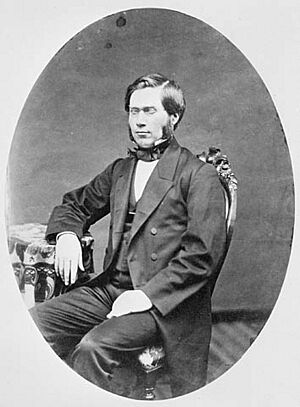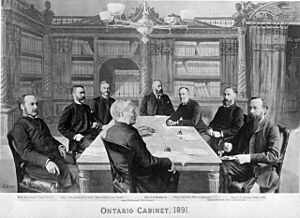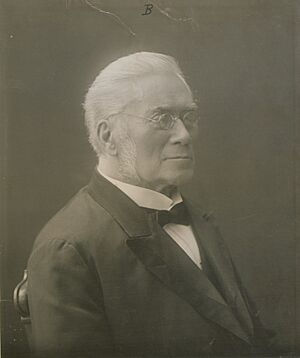Oliver Mowat facts for kids
Quick facts for kids
Sir Oliver Mowat
|
|
|---|---|
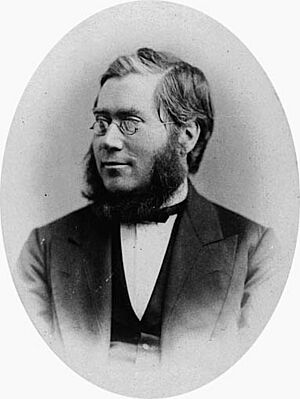
Portrait as premier in1873
|
|
| 8th Lieutenant Governor of Ontario | |
| In office November 18, 1897 – April 19, 1903 |
|
| Monarch | Victoria Edward VII |
| Governor General | The Earl of Aberdeen The Earl of Minto |
| Premier | Arthur Sturgis Hardy George William Ross |
| Preceded by | Sir Casimir Gzowski (acting) |
| Succeeded by | William Mortimer Clark |
| 3rd Premier of Ontario | |
| In office October 25, 1872 – July 12, 1896 |
|
| Monarch | Victoria |
| Lieutenant Governor | William Pearce Howland John Willoughby Crawford Donald A. Macdonald John Beverley Robinson Alexander Campbell George Airey Kirkpatrick |
| Preceded by | Edward Blake |
| Succeeded by | Arthur Hardy |
| 11th Minister of Justice Attorney General of Canada |
|
| In office July 13, 1896 – November 17, 1897 |
|
| Prime Minister | Wilfrid Laurier |
| Preceded by | Arthur Rupert Dickey |
| Succeeded by | David Mills |
| Leader of the Government in the Senate | |
| In office August 19, 1896 – November 17, 1897 |
|
| Prime Minister | Wilfrid Laurier |
| Preceded by | Sir Mackenzie Bowell |
| Succeeded by | David Mills |
| Canadian Senator for Ontario |
|
| In office July 12, 1896 – November 17, 1897 |
|
| Nominated by | Wilfrid Laurier |
| Preceded by | John Ferguson |
| Succeeded by | William Kerr |
| Member of the Ontario Provincial Parliament for Oxford North |
|
| In office November 29, 1872 – July 14, 1896 |
|
| Preceded by | George Perry |
| Succeeded by | Andrew Pattulo |
| Personal details | |
| Born | July 22, 1820 Kingston, Upper Canada |
| Died | April 19, 1903 (aged 82) Toronto, Ontario, Canada |
| Resting place | Mount Pleasant Cemetery, Toronto |
| Political party | Ontario Liberal Party |
| Spouse | Jane Ewart |
| Signature | |
Sir Oliver Mowat (July 22, 1820 – April 19, 1903) was an important Canadian lawyer and politician. He was a leader of the Ontario Liberal Party. He served for almost 24 years as the third premier of Ontario. He was also the eighth lieutenant governor of Ontario and one of the Fathers of Confederation. He is known for protecting the rights of the provinces against the national government. He often disagreed with his political rival, John A. Macdonald. Mowat's long time in power was due to his ability to unite different groups, like Liberals, Catholics, and trade unions.
Contents
Early Life and Education
Oliver Mowat was born in Kingston, Upper Canada (which is now Ontario). His parents, John Mowat and Helen Levack, were Scottish Presbyterians who moved from Caithness, Scotland. When he was young, he supported the loyalists during the Upper Canada Rebellion in 1837. This might suggest he would become a conservative politician. However, he chose to join the Reformers instead.
Marriage and Legal Career
Mowat became a lawyer in Upper Canada on November 5, 1841. In 1846, he married Jane Ewart, whose father was John Ewart from Toronto. Oliver and Jane Mowat had three sons and four daughters. In 1856, Mowat was named a Queen's Counsel, which is a special title for experienced lawyers.
He was known as a very determined lawyer. Two of his cases were even upheld by the highest court in Britain. Mowat once said, "I cannot speak with much force unless I have an opponent."
Political Journey Before Confederation
Mowat started his political career as an alderman in Toronto in 1857. After that, he became a member of the Legislative Assembly of the Province of Canada for South Ontario. From 1858 to 1867, he worked closely with George Brown. Mowat served as Provincial Secretary in 1858 and Postmaster-General from 1863 to 1864. He held these roles in the governments before Confederation for the Liberal Party of Canada.
Mowat was part of the Great Coalition government in 1864. He also attended the Quebec Conference that same year. There, he helped decide how powers would be divided between the federal (national) and provincial (regional) governments. On November 14, 1864, he became a judge. He served as Vice-Chancellor of the Court of Chancery of Upper Canada until he became premier on October 25, 1872.
Premier of Ontario: A Long Tenure
Mowat was the provincial member for the area of Oxford North, which is about 150 km west of Toronto. He represented this area for his entire time as premier.
Defending Provincial Rights
In the 1880s, Mowat's government had many disagreements with the federal government. These disputes were about things like provincial borders, who controlled liquor licenses, trade, rivers, and timber. It was said in 1890 that Mowat successfully fought against all attacks on provincial rights. He did not lose a single case.
These court battles made the federal government less powerful in provincial matters. Even though John A. Macdonald sometimes dismissed Mowat, Mowat's fights with the federal government greatly decentralized Canada. This gave the provinces much more power than Macdonald had wanted.
Key Reforms and Policies
Mowat also served as his own Attorney-General while being Premier. He brought in important changes, such as the secret ballot for elections. He also expanded who could vote beyond just property owners. He introduced new laws about liquor and organized the laws for local governments. His policies, especially on liquor rules and separate schools, sometimes received criticism from political conservatives.
The border between Ontario and Manitoba became a big issue. The federal government tried to extend Manitoba's land eastward into areas Ontario claimed. In 1882, Premier Mowat even threatened to pull Ontario out of Confederation over this. Mowat sent police into the disputed area to show Ontario's claim, and Manitoba did the same. The highest appeal court in Britain, the Judicial Committee of the Privy Council, sided with provincial rights many times. These decisions helped make Canada a more decentralized country, where provinces had more power.
Mowat's government was fair and tried to bridge differences between Roman Catholics and Protestants, and between rural and city areas. He also oversaw the expansion of Ontario's borders to the north. He helped develop the province's natural resources. Under his leadership, Ontario grew into Canada's economic powerhouse.
Mowat's nearly 24 years as premier of Ontario is the longest time any premier has served in Ontario's history. It is the third longest by any premier in Canada.
Federal Politics and Later Years
In 1896, Wilfrid Laurier, who was the leader of the opposition, convinced Mowat to join federal politics. People believed that having a French Canadian (Laurier) and the respected Oliver Mowat from Ontario would help the Liberal party win. Their slogan was "Laurier, Mowat and Victory." They won, and Mowat became the Minister of Justice and a Senator.
In 1897, he was appointed the eighth Lieutenant Governor of Ontario. He served in this role until he passed away in 1903. He is buried in Mount Pleasant Cemetery, Toronto.
Oliver Mowat and John A. Macdonald were once law partners in Kingston. They both led their governments at the same time for 14 years. Macdonald was Prime Minister in Ottawa, and Mowat was Premier in Toronto. Mowat served as premier for almost 24 years.
Family Connections
Mowat's daughter, Jane Helen Mowat, married Charles Robert Webster Biggar. Charles wrote a two-volume book about Mowat's life in 1905. Their son, Oliver Mowat Biggar, became Canada's first Chief Electoral Officer. Sir Oliver Mowat's grandson was the diabetologist Andrew Almon Fletcher.
Sir Oliver Mowat was also the great-granduncle of the famous Canadian author, Farley Mowat. Farley's father, Angus McGill Mowat, was a well-known Canadian librarian who fought in the Battle of Vimy Ridge.
Other Achievements and Legacy
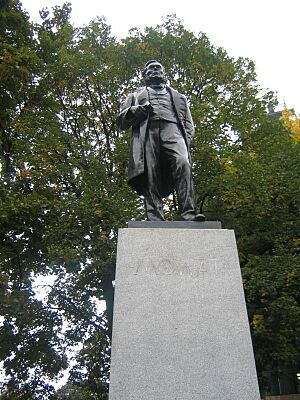
Mowat was made a knight in 1892, which showed his importance in Canada.
He also wrote two small books. In 1890, Mowat documented the first 18 years of his government in Ontario in a book.
After his death, Wilfrid Laurier praised Mowat's policy of tolerance. He said Mowat gave Ontario "a Government which can be cited as a model for all Governments: a Government which was honest, progressive, courageous, and tolerant."
Mowat is honored with a statue in Queen's Park in Toronto. Mowat Avenue in Kingston is named after him.
The Mowat Centre, a Canadian public policy think tank at the University of Toronto, is named in his honor.
The Sir Oliver Mowat Collegiate Institute in Toronto was also named after him.
In 2013, Mowat was played by David Onley (who was the 28th Lieutenant-Governor of Ontario) in the Canadian TV show Murdoch Mysteries. In 2015, Kingston actor Patrick Downes played Mowat in stage plays about John A. Macdonald's life.
The building where Mowat and Macdonald practiced law together in Kingston was renovated from 2014 to 2018. It reopened in 2018 as 'The Kensington' and features historical displays about its past and the Macdonald-Mowat relationship.
Images for kids
 | John T. Biggers |
 | Thomas Blackshear |
 | Mark Bradford |
 | Beverly Buchanan |


